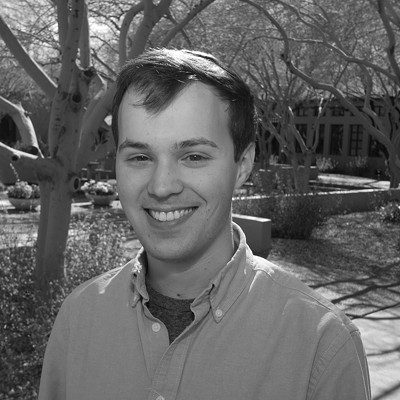Compounded fines and fees can be a major revenue stream for these city courts. But for residents, the municipal court system can be a Kafkaesque part of daily life. The executive director for the American Civil Liberties Union in Arizona described city courts as “a revenue-generating system that turns into an endless maze where there are very few ways for people to get out.”
So, why are these city courts the top earners?
For one thing, municipal judges in Paradise Valley are unpaid volunteers, which greatly reduces expenses. Paradise Valley also imposed greater court fees than other cities. In most cities, court fees on top of penalties were less than one-third of the total revenue; in Paradise Valley, fees added up to two-thirds of the city court’s total revenue.
The city court in Tempe also generated considerable revenue relative to expenditures, according to 2017 budget projections: The court took in approximately $8.4 million from fines and forfeitures in 2017; court operations only cost about $4.4 million.

Representatives for the Goldwater Institute and the American Civil Liberties Union discussed municipal court reform at a press briefing on Tuesday.
Joseph Flaherty
“Most of them do lose money or break even, but there are some notable exceptions,” the report’s author, Mark Flatten, told reporters at the Goldwater Institute on Tuesday morning.
“[Municipal courts] handle a million cases a year. These are the foundation of the court system in Arizona, and that’s the court system most people are likely to interact with,” Flatten added.
According to criminal-justice reform advocates, these interactions are hardly fair. Fines and the punitive measures undergirding them – like an arrest warrant if you don’t pay on time – distort the criminal justice system, effectively stacking the deck against low-income people who find themselves in a municipal court.
It’s not every day that a conservative/libertarian think-tank and a left-leaning civil liberties organization are in agreement on an issue.

Net income figures for the highest-earning Arizona municipal courts, based on budget projections for the 2017 fiscal year.
New Times graphic/Google Sheets
Soler, who served on the state’s Task Force on Fair Justice for All, a 2016 initiative by the Arizona Supreme Court, said the courts and the Arizona legislature require more reform. If city courts are focused on collecting revenue for governmental use, it compromises the fairness of the process, she said. Vulnerable people are affected the most.
“If you fail to make one payment, they’ll seek out a warrant for your arrest; they’ll suspend your license; you won’t be able to drive, you won’t be able to take your kids to school, and you won’t be able to go to work,” she explained. “And the harsh reality is that poor people and people of color are disproportionately impacted by these practices.”
Also at issue for the libertarian Goldwater Institute: a city’s political power to appoint municipal judges.
In every Arizona city except Yuma, city judges are appointed by the city council. The report warns that political pressure on judges can put a thumb on the scale of justice in subtle ways, such as when judges are party to discussions of revenue projections.
“By eliminating the threat of removal, we help to insulate judges from those kinds of self-interested political pressures that they sometimes feel,” said Timothy Sandefur, the institute’s vice president for litigation.
And municipal courts stay extremely busy. Misdemeanor traffic offenses can land you in front of a city court judge, as can violations of city ordinances, which sometimes include head-scratching rules on library books or having excessively tall weeds in your yard.
All told, city courts take up more than half of all the cases in Arizona, according to the Arizona Administrative Office of the Courts – more than 1 million per year. They also raise almost half of all revenue generated by the court system, but account for only about 13 percent of its costs. About half of the money generated by a court goes back into the city’s general fund.
Gary Kula, public defender for the Phoenix Municipal Court, said judges are amenable to the fact that some defendants can't afford to pay surcharges that can amount to 80 percent (or more) of a fine.
"I think there’s a degree of understanding and a degree of being receptive to what a particular case calls for as far as a disposition, as far as what the fine should be or whether the surcharge should be imposed, and as far as whether the surcharges should be waived," Kula told New Times.
The report follows on the heels of growing national attention to the role municipal courts play as a revenue-generator, and the police practices that can accompany them.
A U.S. Department of Justice report in March 2015 identified systemic police and municipal court practices in Ferguson, Missouri, that disproportionately targeted the city’s black residents with arrests and tickets. The report was commissioned after shooting death of an unarmed black teenager, Michael Brown, by a white police officer in Ferguson in 2014.
In Arizona, criminal justice reform is progressing in fits and starts, at least in the move away from a cash bail system. In April, the state’s Supreme Court told judges to adopt a risk-assessment model for releasing low-risk defendants rather than applying standard cash-bail amounts.
Still, based on the revenue numbers shown in Tuesday's report, Arizona has a long way to go. Eliminating the self-interest courts have in assigning fines and fees in order to generate revenue is a good first step, according to the ACLU and Goldwater.
“We believe policymakers need to be doing more, and to find other ways to fund the criminal justice system," Soler said.
The next legislative session will offer another opportunity to take up recommendations from the Fair Justice for All task force. Kula urged legislators to act on recommendations on fines, cash bonds, and expungement.
“I hope those are things that the legislature would give a second look to,” he said. “I think they’re important for giving people a second chance and holding people accountable, but doing it in a way that allows them to move forward – to become productive citizens, to maintain their driving privileges.”
Municipal Courts With the Highest Earnings in Arizona
Tempe
Court revenue: $8,404,268
Court expenses: $4,396,533
Net income: $4,007,735
Scottsdale
Court revenue: $7,766,086
Court expenses: $4,742,649
Net income: $3,023,437
Paradise Valley
Court revenue: $3,347,490
Court expenses: $705,290
Net income: $2,642,200
Tucson
Court revenue: $10,478,630
Court expenses: $9,380,940
Net income: $1,097,690
Gilbert
Court revenue: $3,576,000
Court expenses: $3,237,830
Net income: $338,170
Avondale
Court revenue: $1,311,380
Court expenses: $982,760
Net income: $328,620
Flagstaff
Court revenue: $3,298,980
Court expenses: $3,165,706
Net income: $133,274












